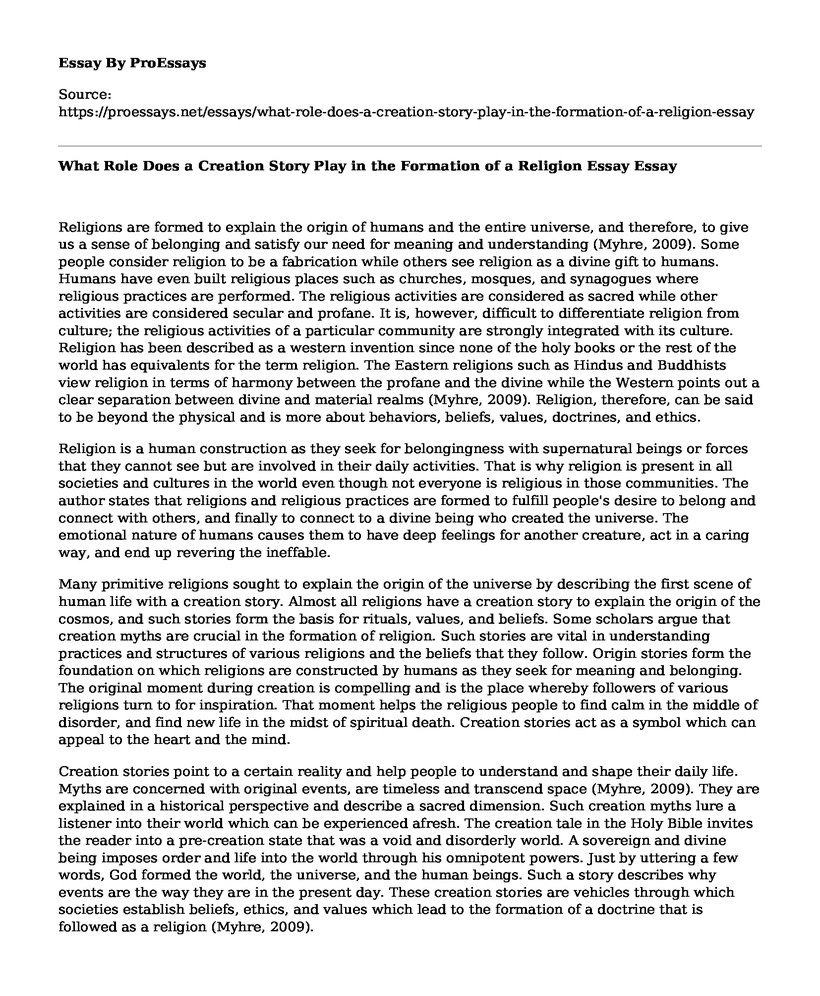Religions are formed to explain the origin of humans and the entire universe, and therefore, to give us a sense of belonging and satisfy our need for meaning and understanding (Myhre, 2009). Some people consider religion to be a fabrication while others see religion as a divine gift to humans. Humans have even built religious places such as churches, mosques, and synagogues where religious practices are performed. The religious activities are considered as sacred while other activities are considered secular and profane. It is, however, difficult to differentiate religion from culture; the religious activities of a particular community are strongly integrated with its culture. Religion has been described as a western invention since none of the holy books or the rest of the world has equivalents for the term religion. The Eastern religions such as Hindus and Buddhists view religion in terms of harmony between the profane and the divine while the Western points out a clear separation between divine and material realms (Myhre, 2009). Religion, therefore, can be said to be beyond the physical and is more about behaviors, beliefs, values, doctrines, and ethics.
Religion is a human construction as they seek for belongingness with supernatural beings or forces that they cannot see but are involved in their daily activities. That is why religion is present in all societies and cultures in the world even though not everyone is religious in those communities. The author states that religions and religious practices are formed to fulfill people's desire to belong and connect with others, and finally to connect to a divine being who created the universe. The emotional nature of humans causes them to have deep feelings for another creature, act in a caring way, and end up revering the ineffable.
Many primitive religions sought to explain the origin of the universe by describing the first scene of human life with a creation story. Almost all religions have a creation story to explain the origin of the cosmos, and such stories form the basis for rituals, values, and beliefs. Some scholars argue that creation myths are crucial in the formation of religion. Such stories are vital in understanding practices and structures of various religions and the beliefs that they follow. Origin stories form the foundation on which religions are constructed by humans as they seek for meaning and belonging. The original moment during creation is compelling and is the place whereby followers of various religions turn to for inspiration. That moment helps the religious people to find calm in the middle of disorder, and find new life in the midst of spiritual death. Creation stories act as a symbol which can appeal to the heart and the mind.
Creation stories point to a certain reality and help people to understand and shape their daily life. Myths are concerned with original events, are timeless and transcend space (Myhre, 2009). They are explained in a historical perspective and describe a sacred dimension. Such creation myths lure a listener into their world which can be experienced afresh. The creation tale in the Holy Bible invites the reader into a pre-creation state that was a void and disorderly world. A sovereign and divine being imposes order and life into the world through his omnipotent powers. Just by uttering a few words, God formed the world, the universe, and the human beings. Such a story describes why events are the way they are in the present day. These creation stories are vehicles through which societies establish beliefs, ethics, and values which lead to the formation of a doctrine that is followed as a religion (Myhre, 2009).
The first humans were created on the sixth day of creation according to Genesis 1. A different account of creation is given in Genesis 2 whereby Adam was created from dust while Eve was created from Adam's rib (Christian, 2017). It is believed that God existed way before creation and it is through His sovereignty and power that the universe was created. Various scholars argue that there were civilizations that existed before Adam. Scientists have used the evolution theory to explain that the earth and the universe are millions of years old, and the Bible only gives stories starting from around 6000 years ago (Gaia Staff, 2017). Scientists had disapproved the creation theory and have been using modern technology to prove the existence of life way before Adam was created. However, the truth is that whether the creation story in Genesis is a fallacy or not will always be a topic of debate depending on people's different religious viewpoints.
References
Christian, J. (2017, January 24). Adam Was Not the First Human, for the Bible Tells Us So. Retrieved from Owlcation: https://owlcation.com/humanities/What-Do-Those-First-Few-Chapters-of-Genesis-Really-Say
Gaia Staff. (2017, September 30). Pre-Adamite Civilization: Did Humans Inhabit Earth Before Adam and Eve? Retrieved from https://www.gaia.com/article/pre-adamite-civilization-did-humans-inhabit-earth-adam-and-eve
Myhre, P. O. (2009). Introduction to Religious Studies. Minnesota: Anselm Academic, Christian Brothers Pub.
Cite this page
What Role Does a Creation Story Play in the Formation of a Religion Essay. (2022, May 09). Retrieved from https://proessays.net/essays/what-role-does-a-creation-story-play-in-the-formation-of-a-religion-essay
If you are the original author of this essay and no longer wish to have it published on the ProEssays website, please click below to request its removal:
- Authority of Scripture in Christianity Essay
- Nursing and Matters of Spirituality and Meaning of Life Paper Example
- Memory, Bias and Heuristics, Human Development Paper Example
- Essay Sample on St. Paul's Academy
- Case Study of Death and Dying
- Essay Example on Christianity Debate: Jonathan vs Alex - The Resurrection
- Essay Sample on Interview with Mr. Xyz: A Catholic Christian Working for American Defense Forces







